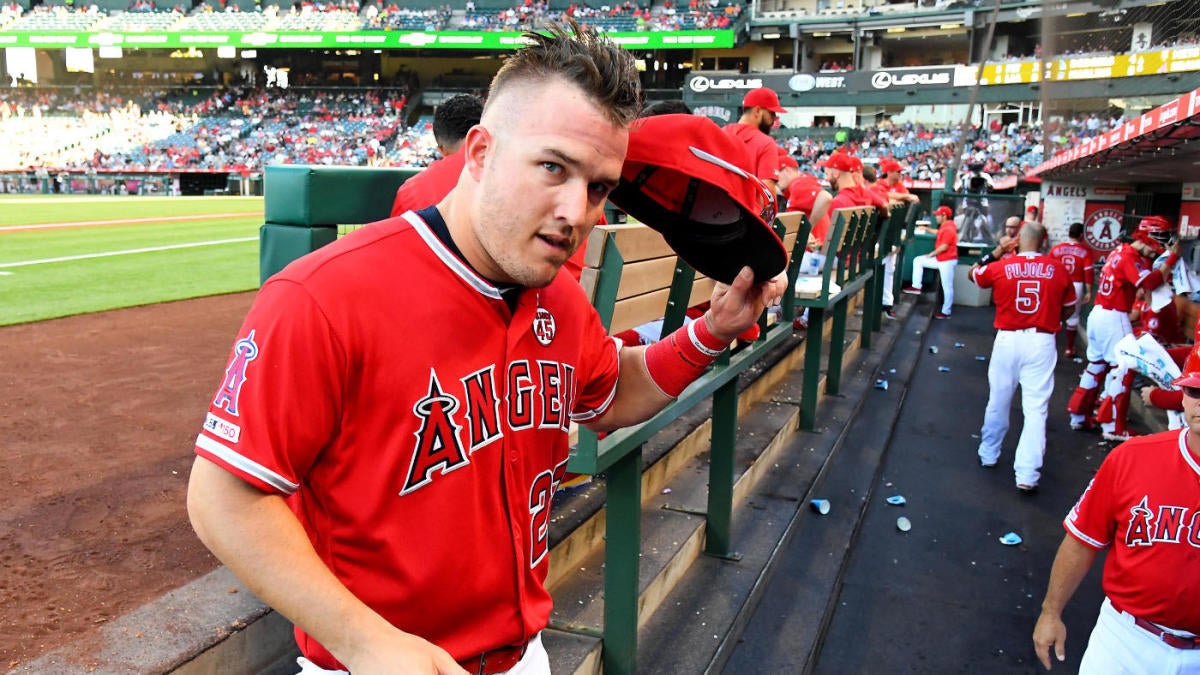
Major League Baseball is moving forward with its plans to run a 2020 60-game season in the midst of the coronavirus pandemic (COVID-19). Players began reporting to their respective stadiums this week. MLB announced the 60-game season, with Opening Day set for July 23-24.
The league has yet to release its official 2020 schedule, but the teams will play in their geographic region. With coronavirus cases on the rise in parts of the United States, especially Arizona, California, Florida, and Texas, it’s fair to wonder if MLB will be able to complete its season. Angels superstar outfielder Mike Trout has become the newest and most notable player to talk about his concerns while playing during the COVID-19 outbreak. Trout, who turns 29 next month, is expecting his first child with his wife Jessica in August.
“Honestly, I’m still not that comfortable with the baby’s arrival,” Trout told reporters through a Zoom call to the media on Friday, including Mike DiGiovanna of the Los Angeles Times. “There are a lot of things on my mind. I’m trying to be the safest and most cautious way to get through the season. It is going to be difficult. I have to be very cautious these next few weeks. I don’t” I don’t want to test positive. I don’t want to give it back to my wife. We are in a difficult situation. “
Trout has yet to make an official decision on whether to be with the Angels for his first game of the 2020 season in three weeks.
“We are playing it by ear,” Trout told reporters, including Bob Nightengale of USA Today. “I think the most important thing is that this is our first child. I have to be there. If I have a positive result, I cannot see the baby for 14 days. We would be upset. I have to keep Jess safe. I have to keep the baby safe. I have to be very cautious. “
When asked why he would play in the 2020 season, Trout replied, “I love baseball. I love playing this game. We all want to play.”
The Angels’ new manager, Joe Maddon, also spoke to reporters Friday through Zoom about the upcoming 2020 season being played out amid the coronavirus pandemic. He told reporters, including Fabian Ardaya of The Athletic, who spoke to the team in a Zoom call on Thursday, allowing Angels players to voice their concerns, including Trout.
“Everyone talks about high risk and those kinds of people who choose not to participate,” Maddon told Nightengale. “For me, the person who should choose not to participate is the person who doesn’t want to follow T protocols at any age, at any risk. That hasn’t been promoted enough.”
While players (and managers, coaches, coaches, translators) are far from stadiums and facilities, they are expected to follow health and safety protocols on their own, and it appears to be the greatest vulnerability in the plan to return to MLB. . People directly involved in the MLB 2020 season are encouraged to avoid crowded restaurants, bars, and clubs. From the league’s health and safety manual:
MLB will not formally restrict the activities of Covered Individuals when they are away from Club premises, but will expect Covered Individuals in each Club to ensure that everyone acts responsibly. The careless actions of a single individual put the entire team (and their families) at risk, and the Covered Individuals in each Club must agree to their own code of conduct off the field for themselves and their family members to minimize the risk to others.
As part of the MLB COVID-19 guidelines, players may decide to opt out of participating at any time. Diamondbacks ‘Mike Leake, Rockies’ Ian Desmond and Nationals teammates Joe Ross and Ryan Zimmerman are among the group of players who chose to sit in the 2020 season.
In the MLB plan, high-risk players who choose not to receive them will receive both their full salary and season service time. Players who have high-risk family members may also choose not to participate, but MLB would leave it up to the teams to decide whether or not they would receive salary or length of service.
High risk would include people with heart, lung, cancer, high blood pressure, or diabetes. Coronavirus is commonly considered a respiratory disease, but many who have tested positive may experience a wide range of different symptoms, including possible effects on the heart.